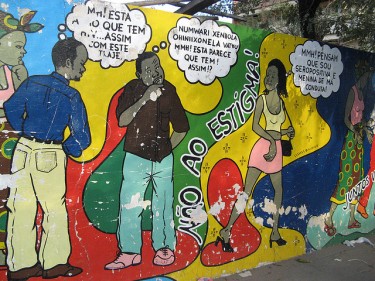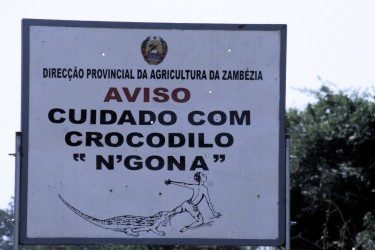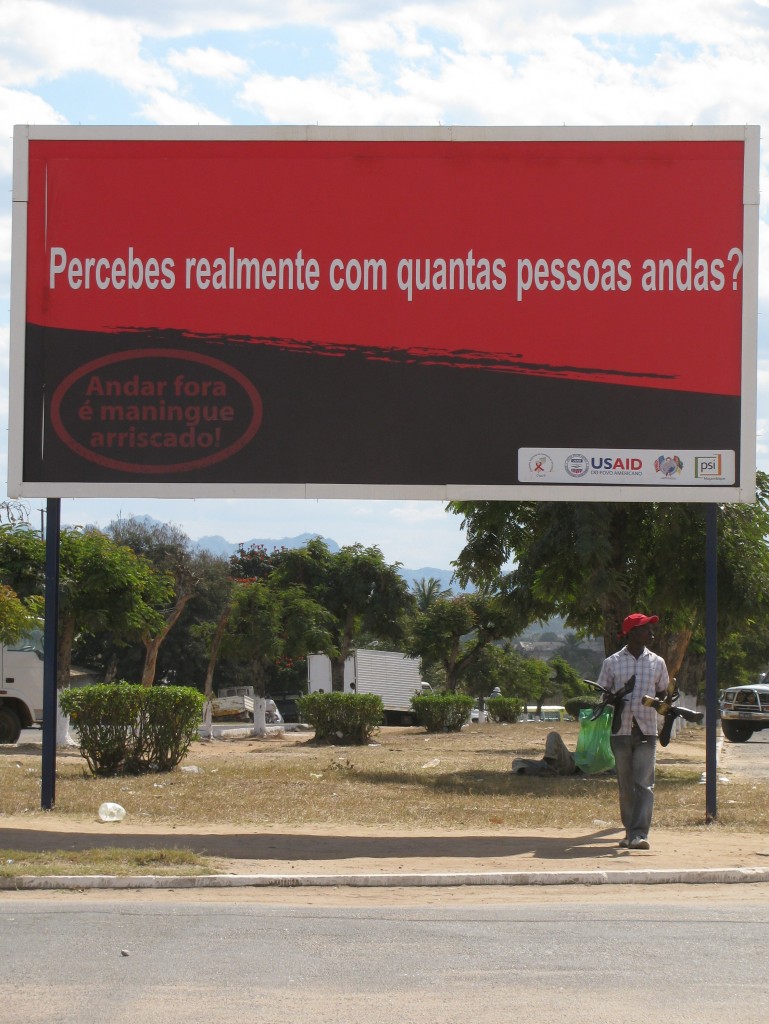This post is part of our special coverage Languages and the Internet.
This May 5 in Maputo, Mozambique, the Day of the Portuguese Language and Culture, of the Community of Portuguese Speaking Countries (CPLP), was celebrated.
One of the great contemporary writers in the Portuguese language, and the most well-known of Mozambican origin, Mia Couto, thinks that after 36 years of independence, with about 40% speaking Portuguese, “only one of the nations of Mozambique lives in the ‘lusophone’ world,” and he argued [pt] in 2001 that “Portuguese is not the language of Mozambicans. But it is however the language of Mozambicanness”.

"Não ao estigma!" (No to stigma!) A bilingual mural in Nampula. Photo by Rosino on FLickr (CC BY-SA 2.0)
Instrument of domination or trophy of independence?
If in 1975, almost 80% of Mozambicans did not speak Portuguese, more Portuguese is spoken today in Mozambique than at the time of independence.
Thirty years ago, the Liberation Front of Mozambique (FRELIMO), still an anti-colonial guerrilla insurgency, saw the European language as a weapon with which to unify the country and construct the Nation. The instrument that served for colonial domination would be converted, in the hands of the nationalists, to its opposite – a trophy of independence, an affirmation.
In a series of blog entries on Moçambique para Todos (Mozambique for all) [pt], on the book “Descolonização e Independência em Moçambique – Factos e Argumentos” (“Decolonization and Independence in Mozambique – Facts and Arguments”) by Henrique Terreiro Galha, revolutionary leader and the first president of Mozambique Samora Machel is quoted [pt] at the end of 1975, in a rally in the Stadium of Machava, in then Lourenço Marques (today the city of Maputo):
outros dirão mas a língua ainda é portuguesa. É preciso utilizar a língua do inimigo. A língua portuguesa agora já mudou de conteúdo, não é aquele português que era falado pelo senhor Governador em Moçambique. Deve ser o nosso português de moçambicanos.
Galha adds [pt]:
O português era o único veículo de comunicação entre as diversas etnias. Foi uma decisão difícil, tomada a contra-gosto. Num seminário realizado em Mocuba (Zambézia), no início de 1975, com a presença de Joaquim Chissano, foi salientado e relembrado, como tarefa dos grupos dinamizadores, “a necessidade de transformar (sic) a língua portuguesa, de instrumento de despersonalização e opressão, em veículo de comunicação do Povo.”
A particular Portuguese
While the existing data [pt] show that the majority of Mozambicans communicate using 43 national languages [pt], the Portuguese language is considered one of the elements of national unity. According to Mia Couto [pt], “the Mozambican government did more for the Portuguese language than centuries of colonization (…) its own national interest, to defend national cohesion, for the construction of its own interiority.”
In a debate hosted by the Brazil-Mozambique Cultural Center for May 5, the Minister of Culture, Armando Artur, reaffirmed [pt] that the Portuguese language is part of Mozambique's linguistic patrimony, living along side national languages:
Com o advento da Independência Nacional, ela viu o seu prestígio mais reforçado com a sua adopção como um elemento de Unidade Nacional, passando, deste modo, a ostentar o estatuto de língua oficial em Moçambique.
Artur, member of government and Mozambican writer, added that increasingly, Mozambicans are appropriating the Portuguese language through a process of interaction with national languages, lending it unique aspects, resulting in the consubstantiation of new words and expressions.
However this element of Unity is questioned by a number of sectors in society. In 2009, in a comment on the blog Moçambique para Todos, Elísio Fonseca pointed out [pt]:
The expression "wandering outside is maningue risky" means "to betray is very risky." Maningue is a typically Mozambican word which means "very" and comes from "many" in English. All the countries that border Mozambique have English as an official language. Image by Amanda Rossi, used with permission.
Em nome da “unidade nacional” o nosso governo colocou um manto sobre a nossa cultura, menosprezando o ensino das línguas, hostilizando todos os nossos valores culturais. Há linguistas que consideram isto um erro tremendo. Para eles, a capacidade de um adolescente moçambicano em aprender uma língua estrangeira, seja o português ou o inglês, mede-se pelo domínio que tem da língua nativa. Sem esta base sólida, argumentam, torna-se mais difícil essa aprendizagem. Mas o erro foi feito, e hoje reflecte-se no nível do português falado entre muitas camadas da nossa sociedade.
Max Coutinho, of the blog Etnias (Ethnicities) [pt], gives an example of a “recurrent imprecision” which reflects this “level” mentioned by Fonseca in the use of the official language:
Os cidadãos de Maputo, tanto em solo nacional como na diáspora, confundem os verbos Ir (deslocar-se de um lugar para outro para lá ficar; afastando-se) e Vir (transportar-se para cá).
Fátima Ribeiro, with a degree in Language and Modern Literature, comments [pt]:
O Português falado em Moçambique é diferente do falado noutros países lusófonos. Nós estamos a construir o nosso Português que tem várias influências das nossas várias línguas maternas e também do inglês. É um Português que, em termo de vocabulário, gramática e estrutura, é diferente naturalmente.
The decision to ratify the Orthographic Accord, which is meant to unify Portuguese spoken in the countries that use it as an official language, has been analyzed for more than two years. In the blogosphere, many question if it is “worth it to spend US$111 million to change a language”, like Eduardo Quive, of the blog Quivismo, in an in-depth report [pt] about the debate on May 5.
At the same time, in recent years, Mozambique has started to introduce national languages into the education system for the educational development in the country. Presently, there are 300 schools teaching in two languages and there 16 other national languages being tested.
This post is part of our special coverage Languages and the Internet.
On the Portuguese language and other languages spoken along side Portuguese, also read the following articles that Global Voices published in 2011:








